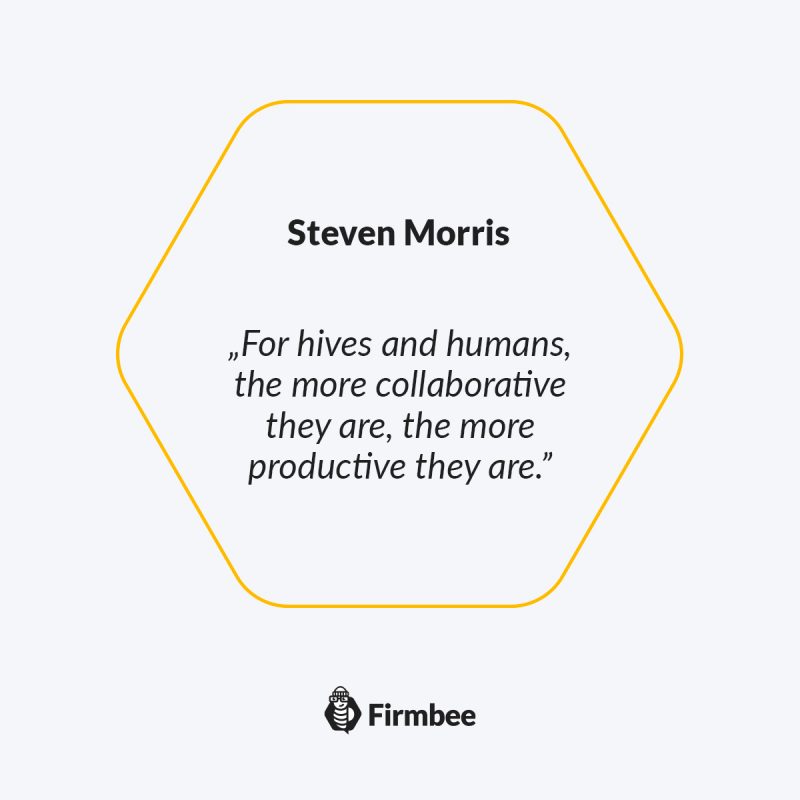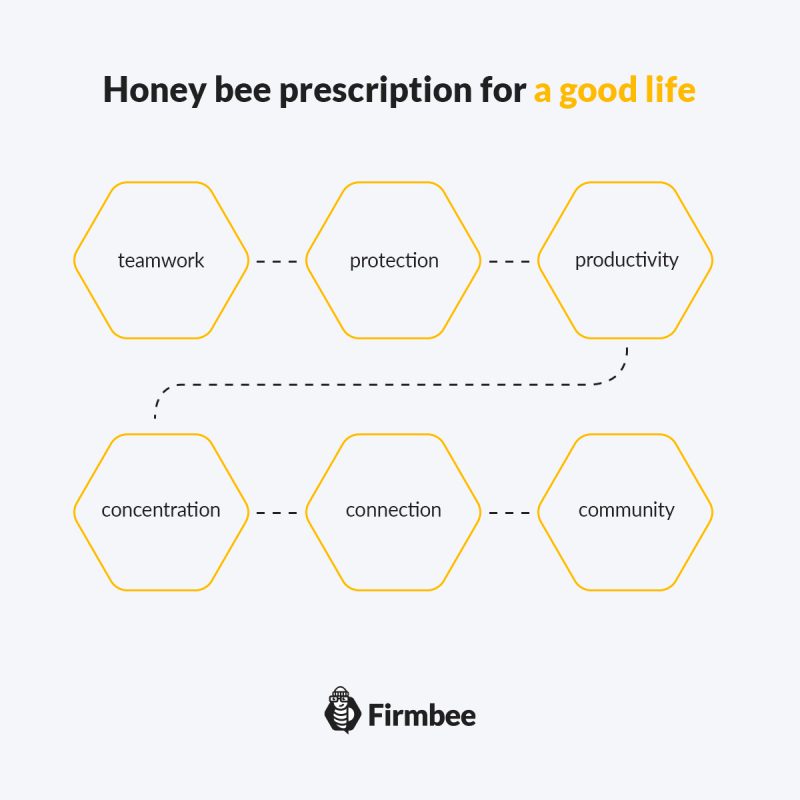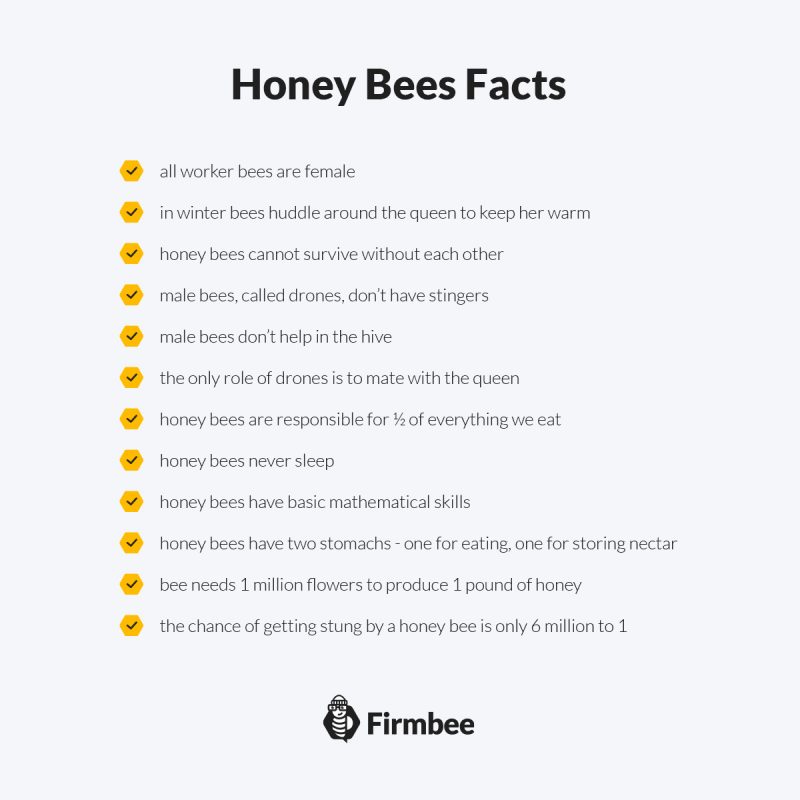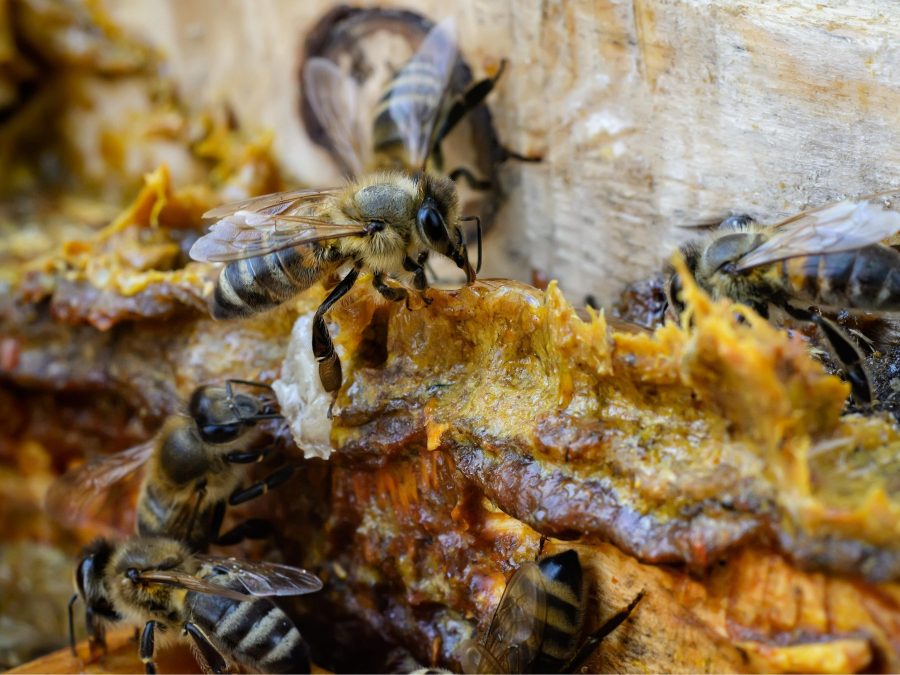What kind of tips for productivity can we get from other species? Can insects teach us anything about being productive? What are the natural ways to be successful? What can we learn from the honey bees? Read the article to find out more about great tips for productivity from the most efficient workers on Earth.
What can we learn from the honey bees? Tips for productivity – table of content:
- Be productive – give 100% of your focus
- Be smart – care for your memory
- Be caring – help others
- Be sensitive and be passionate at the same time
- Be yourself – your size doesn’t matter
- Be a good team player
- Be loyal – stick to your role
- Be fair – think about equality
- Be reasonable – take time to rest
- Summary
Be productive – give 100% of your focus
Honey bees are not huge fans of multitasking, instead they focus on one task at a time and always prioritize the most important from the perspective of the hive tasks. Individual bees have different duties, but they stick to them and don’t change their role without the need. There is no time waste, no disorganization, just great efficiency and order.
Be smart – care for your memory
Honey bees in comparison with humans have better memory and other cognitive skills. They can travel really long distances and still they can easily remember their way back home. It has been discovered that honey bees have some basic mathematical skills, they are able to perform addition and subtraction. They can count, order, and they understand the concept of zero.
Communicative skills of bees are far from being fully understood – honey bees communicate with flowers and with fellow bees efficiently. Bees can detect the electrical charge of plants, hence they know for sure which plant is ready to be visited for pollen collection. Bees don’t visit plants that are charged negatively and allow them to regenerate before the next collection. It seems that plants don’t want to attract bees if they have nothing to offer – where there is no pollen there are no bee’s visits.

Be caring – help others
There are several examples of mutual care in the collective of bees. Honey bees are strongly devoted to each other and are eager to give their own lives for their hive and for the collective. Honey bees can detect when their fellow bee is distressed and fly to offer their help. If one of the honey bees is in pain, the other jumps on her back and searches for the reason: removes the object that causes hurt.
The care goes beyond this and when bees know about good plants they share this information with their fellow bees. To pass the knowledge about new, fresh plants they use movements, called waggle dance to give precise directions.
Honey bees show greater generosity and breathtaking ability to share. Honey bees that collect nectar live only 30 days, therefore they usually never try the honey they have helped to produce – it takes to months to produce the honey. The honey is essential for the survival of the hive, but the individual bee has no benefit of its own work and never gets to see the fruit of its labor.
Be sensitive and be passionate at the same time
Honey bees are not hostile and never attack without reason. To keep them calm, you yourself have to stay calm. All of the workers in the bee hive are female. They are hard workers, but they are among the most sensitive and intelligent insects on the planet. Honey bees teach us that it is possible to be warm, caring, sensitive and passionate, strong, fierce at the same time.

Be yourself – your size doesn’t matter
The wings of a honeybee are 1/18th the size of its body. Honeybees beat their wings 230 times in a second during their flight. One little honey bee can fly up to 5 miles a day, but the whole hive is able to fly 90 000 miles to collect approximately 1 kg of honey. Bees don’t need tips for productivity, they are hard working, hence successful.
Be a good team player
Honey bees live in colonies, they cannot exist alone. Their hives are the best example of highly organized, harmonious social structures. Each individual honey bee performs a different task, but all tasks are greatly coordinated: honey bees work in such synchronicity that their levels are not imaginable for humans. They switch tasks through their lifetime and they perform different tasks consecutively, they can be: cleaners, caretakers, pollen collectors, honeycomb builders, and hive repairers.

Be loyal – stick to your role
All honey bees have specific roles. Everybody knows their duties and carries them out. Generally there are three basic roles in the society of the beehive: a queen, the drones and the workers, but as it was later discovered – the workers have many specific functions, so they don’t really represent one group of roles. It is more complex, but still understandable: nobody stays without his own role. It seems that loyalty to the role helps to rise efficiency of the hive so the bees don’t need any other tips for productivity.
Be fair – think about equality
Bees colonies are very complicated social structures, but what is visible at a first glance is the fairness of the organization. There are no real privileges in the hive, everybody has to perform and stick to his own role. The drones have to fertilize the queen hence they don’t have to work, but still they have to leave the hive before winter and die after the mating ritual. The highest goal of the collective is the survival of the entire hive, not the well-being of one, singular insect. This is a form of equality, because no creature is sacrificed for no reason or left without help out of cruelty.

Be reasonable – take time to rest
Even bees don’t work all the time. They spend two-thirds of their time doing nothing. When they work they are the best and most focused workers, but they respect themselves and care to have enough time to recharge the batteries. Among many tips for productivity the idea of proper rest is one of those that oneself is able to increase productivity beyond normal levels. Taking regular rest boosts alertness, increases energy levels and helps to avoid exhaustion. Honey bees know well how to keep the balance – sometimes doing less is actually doing more.

Tips for productivity – summary
There are species that surpass humans in many aspects of living. Honey bees play an important role in keeping the balance of life on Earth. They are responsible for pollinating more than a hundred food crops and flowers and many living creatures depend on their actions. Their impact is immense – they are the most productive and efficient entities on Earth.
Read also: The 20 best productivity apps for Mac
If you like our content, join our busy bees community on Facebook, Twitter, LinkedIn, Instagram, YouTube.
Author: Andy Nichols
A problem solver with 5 different degrees and endless reserves of motivation. This makes him a perfect Business Owner & Manager. When searching for employees and partners, openness and curiosity of the world are qualities he values the most.


















